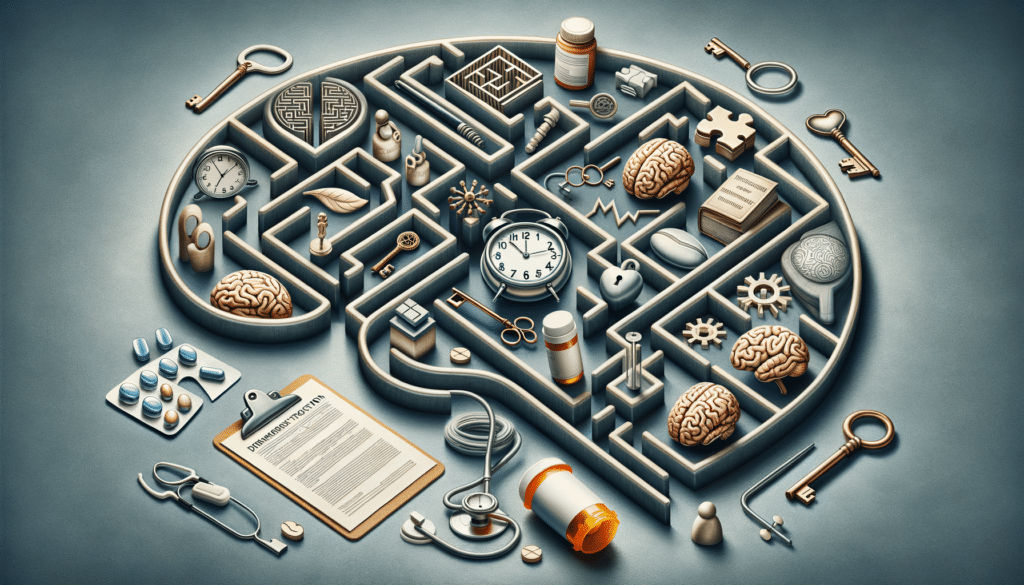Introduction to Alzheimer’s Disease
Alzheimer’s disease is a progressive neurological disorder that primarily affects memory and cognitive function. It is the most common cause of dementia among older adults, and its impact on individuals and families is profound. Understanding the signs and symptoms of Alzheimer’s is crucial for early detection and management, which can significantly improve the quality of life for those affected. As the global population ages, the prevalence of Alzheimer’s is expected to rise, making it a critical public health issue. This article explores the signs and symptoms of Alzheimer’s disease, as well as current treatment options and ongoing research efforts.
Recognizing the Signs and Symptoms
Alzheimer’s disease often begins with subtle memory lapses that are easily dismissed as normal age-related forgetfulness. However, as the disease progresses, these memory issues become more pronounced and are accompanied by other cognitive impairments. Key signs and symptoms include:
- Memory Loss: Frequent forgetfulness, particularly of recently learned information, is one of the earliest signs.
- Difficulty Planning or Solving Problems: Challenges in developing and following plans or working with numbers.
- Confusion with Time or Place: Losing track of dates, seasons, and the passage of time.
- Trouble Understanding Visual Images and Spatial Relationships: Difficulty reading, judging distance, and determining color or contrast.
- Problems with Words: Struggling with vocabulary, finding the right word, or following conversations.
- Misplacing Things: Putting items in unusual places and being unable to retrace steps to find them.
- Decreased or Poor Judgment: Experiencing changes in decision-making or judgment.
- Withdrawal from Work or Social Activities: Avoiding social engagements or work projects.
- Changes in Mood and Personality: Becoming confused, suspicious, depressed, fearful, or anxious.
Recognizing these signs early can lead to a timely diagnosis and intervention, which are crucial for managing the disease effectively.
Diagnosis and Early Detection
Diagnosing Alzheimer’s disease involves a comprehensive assessment that includes medical history, physical and neurological exams, and cognitive tests. Healthcare providers may use brain imaging techniques, such as MRI or CT scans, to rule out other causes of cognitive impairment. Early detection is vital as it allows for the initiation of treatment strategies that can slow the progression of symptoms.
Recent advances in biomarkers and genetic testing have improved the ability to detect Alzheimer’s disease in its early stages. Biomarkers, such as amyloid-beta and tau proteins found in cerebrospinal fluid, can provide valuable information about the presence of Alzheimer’s pathology. Genetic testing can identify individuals with a higher risk of developing the disease, although it is not routinely used for diagnosis.
By identifying Alzheimer’s disease early, individuals and their families can better plan for the future, access support services, and participate in clinical trials that aim to find new treatments.
Treatment Options and Management Strategies
While there is currently no cure for Alzheimer’s disease, several treatment options can help manage symptoms and improve quality of life. Medications such as cholinesterase inhibitors and memantine are commonly prescribed to enhance cognitive function and slow symptom progression. These drugs work by regulating neurotransmitters in the brain, which can help improve memory and thinking.
Non-pharmacological interventions are also essential in managing Alzheimer’s disease. Cognitive stimulation therapy, physical exercise, and a healthy diet have been shown to support brain health and may slow cognitive decline. Additionally, creating a safe and supportive environment is crucial for individuals with Alzheimer’s. This includes simplifying daily tasks, establishing routines, and using memory aids to reduce confusion and stress.
Support for caregivers is equally important, as they play a critical role in the management of Alzheimer’s disease. Access to respite care, support groups, and educational resources can help caregivers cope with the challenges of caring for a loved one with Alzheimer’s.
Ongoing Research and Future Directions
Research into Alzheimer’s disease is a rapidly evolving field, with scientists exploring various avenues to better understand and treat the condition. One promising area of research involves the development of disease-modifying therapies that target the underlying pathology of Alzheimer’s. These therapies aim to reduce the accumulation of amyloid-beta plaques and tau tangles in the brain, which are characteristic features of the disease.
In addition to drug development, researchers are investigating lifestyle interventions that may reduce the risk of Alzheimer’s. Studies suggest that a combination of regular physical activity, a balanced diet, cognitive engagement, and social interaction can promote brain health and potentially delay the onset of Alzheimer’s symptoms.
Clinical trials are essential for testing new treatments and interventions, and participation in these studies is encouraged for individuals with Alzheimer’s disease and their families. By contributing to research efforts, participants can help advance our understanding of the disease and pave the way for future breakthroughs.
As research continues to progress, there is hope for new treatments that can alter the course of Alzheimer’s disease and improve outcomes for those affected. The collective efforts of scientists, healthcare providers, and the community are crucial in the fight against Alzheimer’s.
Conclusion
Alzheimer’s disease is a complex and challenging condition that affects millions of individuals and their families worldwide. Early detection and intervention are key to managing symptoms and improving quality of life. While there is currently no cure, ongoing research offers hope for future treatments that can alter the disease’s trajectory. Understanding the signs and symptoms, exploring available treatment options, and staying informed about research developments are essential steps in addressing the impact of Alzheimer’s disease.
